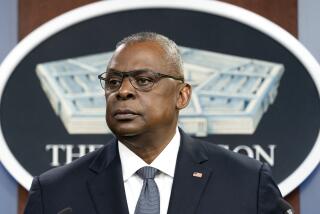U.S. Plans Shift in Iraq Strategy
- Share via
WASHINGTON — President Bush is expected to announce a significant shift in strategy for improving Baghdad’s security when the Iraqi prime minister visits Washington next week, an acknowledgment that a much-publicized military operation launched last month has failed to stem the violence.
The U.S.-Iraqi offensive was touted as a major initiative by the government of Prime Minister Nouri Maliki. But the operation has failed to prevent sectarian violence in Baghdad from escalating to unprecedented highs.
A United Nations study released this week found that 3,149 civilians were killed in Iraq in June -- an 18% increase from May -- and that most of the deaths occurred in Baghdad.
A senior administration official, speaking on condition of anonymity, as is routine when discussing future White House initiatives, said the new strategy that Bush and Maliki intended to hash out would include “shifts in resources” and “shifts in emphasis.”
The change could include redeploying U.S. forces from elsewhere in the country to Baghdad.
“There’s been a Baghdad security plan in place for about five weeks now, and I would say it’s fair to say the results, or the initial results, of that plan have been disappointing,” the official said. “There’s an open question about whether ... more forces will come from other parts of the country.”
Iraqi forces have taken over security responsibilities in several Baghdad neighborhoods in recent months.
Asked whether the shift in strategy could lead U.S. forces to reassume control of those areas, the official said, “That certainly would be an appropriate thing ... to discuss.”
During a trip to Baghdad last week, Defense Secretary Donald H. Rumsfeld said the number of U.S. forces in the Iraqi capital had already increased from 40,000 to 55,000 in response to the surge in attacks. Any additional increase would make it difficult for the Bush administration to follow through on its goal of reducing the U.S. troop level in Iraq before the November congressional elections.
The new security policy for Baghdad probably will include an increased emphasis on rounding up local leaders who are instigating and provoking sectarian violence, such as members of the militia loyal to radical Shiite cleric Muqtada Sadr. He has been blamed for inspiring much of the anti-Sunni violence perpetrated by Shiite death squads.
The early stages of this strategy have been rolled out in recent days in both Baghdad and Basra, the southern port city where unrest also has increased, and U.S. officials say the move has shown promise.
Maliki’s U.S. visit, which is to begin Monday, will include an address Wednesday to a joint session of Congress. In his speech, he is expected to thank U.S. forces and the American people for the sacrifices they have made in Iraq and to extol his country’s progress in establishing a democratic form of government.
But the visit will not be highlighted by the type of pomp and circumstance that, for example, accompanied Hamid Karzai’s first visit to Washington as Afghan president, a reflection of the dire security situation in Iraq.
The administration official called the four-day trip “a quintessential working visit.”
The administration’s acknowledgment that the Maliki government has failed to improve security in Baghdad in its first months in office is the latest in a series of assessments about Iraq that are more sobering than those previously issued by U.S. officials.
The new tone comes as Republicans in Congress have urged the White House to be more open about the challenges in Iraq and less rigid about acknowledging mistakes.
Apart from the security situation, Bush and Maliki probably will discuss the prime minister’s recent denunciation of Israeli airstrikes in Lebanon, the first major policy split between the U.S. and Iraq since Maliki assumed office in May. Maliki heads a Shiite political party in majority Shiite Iraq; Hezbollah is a Shiite militant group that has become increasingly popular with Lebanese Shiites.
More to Read
Sign up for Essential California
The most important California stories and recommendations in your inbox every morning.
You may occasionally receive promotional content from the Los Angeles Times.













